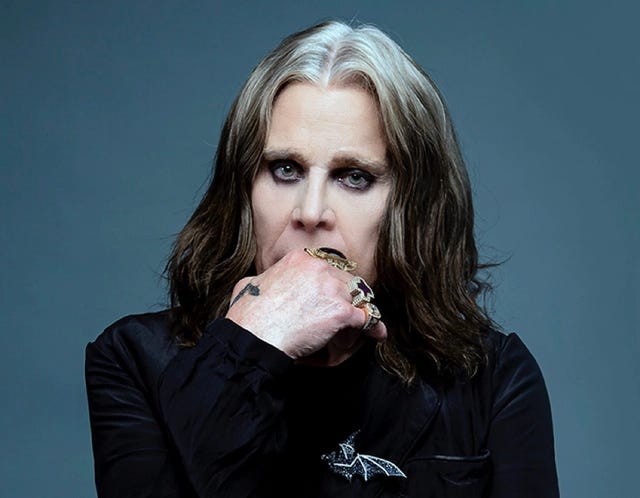Remembering Ozzy Osbourne, Dead at 76
"We've eventually all got to face the inevitable," he once told me
The death of Ozzy Osbourne Tuesday at 76 couldn’t have come as a huge surprise.
The heavy metal pioneer and unlikely reality show star had been considering the concept of death since the thudding, influential sounds of the early Black Sabbath albums, on tracks like “Behind the Wall of Sleep,” “Electric Funeral” and “Children of the Grave.” The most controversial song from his 1980 solo debut “Blizzard of Ozz was “Suicide Solution.”
And mortality would often come up when talking with Ozzy..
“We’ve eventually all got to face the inevitable,” he told me in an interview, back when his latest album had the lyric: “Should I think about tomorrow? Should I live for just today?”
“I had a doctor tell me ‘if you don’t stop doing that, you’re going to die.’ And I said, ‘Well, we’re all going to die.’ And he said, ‘Yeah, but you don’t have to die as soon.’”
At the time, he had been 10 years without a cigarette after a lifetime heavy smoking. It would be a couple of years later when he’d break his neck in an ATV accident. Various illnesses later on caused tour cancellations over the years including one called No More Tours 2. Another fall came in 2019, shortly before he was first diagnosed with Parkinson’s disease.
But on that day, late in 2001, his mind was on mortality mostly because George Harrison had just died.
“It’s a pretty sad day,” he said, describing himself as a “big-time” Beatles fan. “They really, truly were an incredible force on Western civilization..”
His mind went back to his young days in Birmingham, England. “I remember sitting on a wall with a blue transistor radio and heard ‘She Loves You.’ From the first time you heard it, you were instantly sucked in From then on, I was a complete and utterly besotted Beatles fan.”
And though he went on to sometimes record one of their songs, like “In My Life” in 2005, most of his hard-charging music was unique to his sound - a yowl over a thunder of guitars.
And as menacing as it sounded in 1970 when a hard rock high school friend turned me on to those decibel classics — creating a base line against which all future metal would be judged, Ozzy in concert was just the opposite of monstrous. Instead, he was outgoing, engaging and cheerful, demanding people put up their hands or otherwise take part, more like one of the lovable oversized creatures in Maurice Sendak’s “Where the Wild Things Are” than any malevolent gothic force in the dark of which he sang.
With Sabbath or fronting his own bands, which were notable for showcasing standout metal guitarists from Randy Rhodes to Zakk Wylde, he retained his fandom over generations, with a determination that underscored his Black Sabbath declaration, “I am Iron Man.”
When I spoke to him he had been touring that year both as a solo act and in a reunion with Sabbath, which had kicked him out and replaced him with Ronnie James Dio in 1979. Sabbath was headlining the terrifically successful tour still named after the unquestioned leader: OzzFest. And the solo tour coming up would run right through Christmas.
“It’s what I do,” he said. “You don’t want to take too much time away.”
Besides, he said, ”I fuckin’ hate Christmas. The idea that everybody runs up their credit cards, and spend all the money you made all year, it’s crazy…I don’t like it.”
He was going to go as far as call that tour with Rob Zombie “Black Christmas’’ — but it was too soon after 9/11. Instead it was “Merry Mayhem” tour, with Ozz Bless America merch on sale, raising money for relief organizations.
The intent matched the sentiment on one of his new songs on his album at the time, “Dreamer,” an unabashed variation of John Lennon’s “Imagine,” which asked “When will all this anger, hate and bigotry be done?”
“It was a song about a global kind of peace that was written about three years ago, though it’s perfect for now,” Osbourne said.
Little did he know he was about to turn to a new chapter of his life that would bring wider fame, but not much peace. It involved a TV show.
“MTV is doing a ‘Real World’ kind of thing at my house, though it’s just me,” he mentioned. “They’re filming me picking up dog crap and trying to be a father, having the occasional bottle of wine. This is nothing special, but Sharon came back from MTV and they’re going crazy about it. Ten episodes, they want.”
The resulting phenomenon The Osbournes, would go on to have more than 50 episodes over four seasons, winning an Emmy, spawning specials, spin-offs, magazine covers and coveted cameo appearances. It also sparked TV careers for his wife Sharon, ad offspring Jack and Kelly, who all fronted their own eventual shows (another daughter Aimee, opted out of The Osbournes altogether).
Even as it became one of MTV’s highest rated shows, featuring Ozzy Osbourne as a kind of latter day Ozzie Nelson, trying to make sense of modern technology, and trying to preside over a chaotic home life, he never lost his credibility in the world of metal as he became an esteemed elder figure.
He showed his commitment to fans by working out for years in order to put on one final concert in his hometown of Birmingham July 5, that raised $190 million for local hospitals and a cure for Parkinson’s, one of the highest grossing charity concerts of all time. Osbourne told press beforehand it was his chance to “say thank you to my fans for always supporting me and being there for me.”


